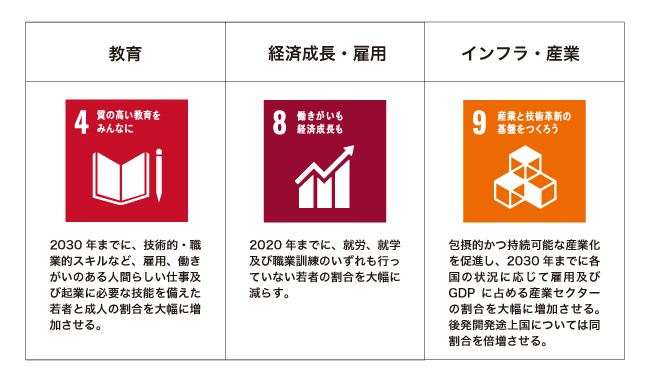〜The goal is to contribute to the continuation of learning in such the COVID-19 pandemic and to improve the passing rate of the TVET graduation exam.
Tatsuno Joho System K.K. (Head Office: Tatsuno City, Hyogo Prefecture, President: Yoichiro Nishimura) has signed a contract with the Japan International Cooperation Agency (JICA) for the "the Information Collection Survey of a new e-learning self-study tool for TVET Diploma/Certificate Acquisition in Pakistan. (contract period The contract period is from October 22, 2021 to September 15, 2022) and the project has started.

Background of the Survey
Pakistan is ranked 110th out of 141 countries in the 2019 World Competitiveness Report (World Economic Forum), behind other South Asian countries, and there is an urgent need to develop its own industries, strengthen its international competitiveness, and achieve economic growth without relying on external debt.
In its mid- to long-term strategy, "Vision 2025," the Japanese government has announced plans to expand the size of the economy and increase productivity, but there is a shortage of industrial human resources, which are indispensable for industrial development.
On the other hand, the country's young population (under 25 years old) accounts for about 60% of the total population, and the working population is expected to double in the next 35 years. Stable employment for young people is very important for economic growth, but the unemployment rate for 15-24 year olds is 10-11%, which is higher than the average of 5.79% for all age groups, and many of them work in the informal sector, where conditions are unstable and poor. This is partly due to the lack of professionalism and official qualifications and education.
In response to these challenges, the government of Pakistan has launched "Skills for Growth & Development: a TVET Policy for Pakistan" (2015). By strengthening the capacity of teachers, revising curricula, and establishing a national qualification framework, the government aims to bridge the gap between the needs of industry and education and training, and to develop human resources in TVET (vocational technical education) and ensure a stable supply of human resources. According to the Punjab Board of Technical Education (PBTE), which oversees the graduation examinations, the average pass rate (2018) for all courses offered in technical colleges and vocational training schools is 47.82%.
"Diploma" and "Certificate" qualifications are one of the key requirements for employment in the formal sector. As diploma and certificate qualifications are one of the key requirements for employment in the formal sector, dropping out of school without a diploma is very disadvantageous for students to find employment, and also causes a shortage of quality human resources in the industry.
Students are given problem sets by the school with insufficient preparation for exams due to lack of study time due to commuting to school while working, or inability to take paid remedial courses due to financial situations. This is the cause of the lack of guidance.
Purpose and scope of the study
Contribution to the tasks to be accomplished in the medium term
By using learningBOX as a self-study tool for graduation exams at TVET institutions, we aim to improve the pass rate and contribute to increasing the rate of "Diploma" and "Certificate By using the learningBOX as a self-study tool for graduation exams at TVET institutions, we aim to improve the pass rate and contribute to the improvement of "Diploma" and "Certificate" qualification acquisition rates.
The ability to obtain a diploma or certificate, which is an advantageous qualification for full-time employment, will help to secure employment for young people and protect them from vulnerability of employment under the spread of infectious diseases. It is also a way for young people to be protected from the vulnerability of employment under the spread of infectious diseases.
It is also expected to increase the supply of high-quality industrial human resources and core production personnel by producing a large number of qualified personnel from TVET institutions.
Since the learningBOX will also be used for self-study of general subjects with low pass rates, it is hoped that it will eventually be used as a self-study tool in general education secondary schools as well, which will improve the pass rate of graduation exams in schools and contribute to securing stable employment and improving advancement to higher level schools.
In addition, it is expected to improve the ICT utilization skills of teachers who develop the content and schools who manage the learning results. We also plan to investigate the possibility of contributing to the empowerment of women domestic workers and non-formal education teachers.
Contributing to the 17 Sustainable Development Goals (SDGs)
In this project, we will contribute to the target regions in the following three areas out of the 17 items of the Sustainable Development Goals (SDGs): education, economic growth and employment, and infrastructure and industry.

Future Developments in the survey
The following are the main topics that will be addressed in this survey
◯We will conduct interviews with government agencies, related organizations, and other stakeholders about the issues.
◯We will hold a product demonstration and a workshop prototyping sample teaching materials at the TVET organization pilot schools in Punjab.
◯We will conduct questionnaires and market analysis (market size, trends, customer image, needs, and reaction to products).
We will discuss the interest and possibility of introducing e-learning in TVET institutions, and the possibility of solving problems using learningBOX.
About JICA
https://www.jica.go.jp/about/index.html